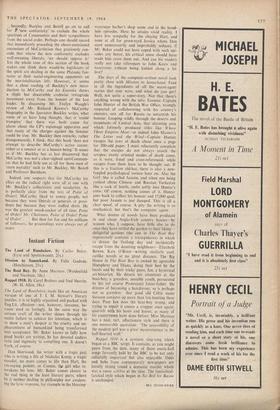Instant Fiction
The Land of Rumbelow, reads like an American version of one of J. I. M. Stewart's literary puzzles, it is so highly organised and packed with Eng.Lit. allusions—not, however, tiresome, be- cause used so lovingly. In the same way the serious craft of the writer shines through his entire failure to achieve his intention, which is to show a man's despair at the cruelty and un- pleasantness of humankind being transformed into acceptance. Mr. Baker knows so fully how good books are written, he has devoted endless taste and ingenuity to compiling one. It doesn't work, of course.
Dan Sherwood, the writer with a tragic past who is writing a life of Nicholas Kemp, a tragic novelist, no more comes to life than Hart, the ?'es-saying painter, or Connie, the girl who re- awakens his love. Mr. Baker comes closest to the real thing in the least literary parts, where he is neither dealing in philosophy nor awaken- ing the lyric response, for example in the Herning- wayesque barber's shop scene and in the hood- lum episodes. Here he attains vivid reality. I have less sympathy for the cloying Hart, and none at all for green-eyed Jessica whom Dan most unnecessarily and improbably seduces; if Mr. Baker could not have coped with such epi- sodes any better, his critical sense should have made him cross them out. And can his readers really not take references to John Keats and narcissism without being kidded along a bit first?
The days of the computer-written novel look pretty close with Mission to Samarkand. Feed in all the ingredients of all the secret-agent stories that ever were, and what do you get? Well, not quite a super-story. Not that there's anything wrong with the info. Ecoutez. Captain John Hunter of the British War Office, wrongly suspected of collaborating with his country's enemies, sets off for Russia to untarnish his honour. Looping wildly through the deserts and mountains of . Central Asia, that alarming area which formerly produced titles like Where Three Empires Meet—or indeed John Masters's The Lotus and the Wind—Captain Hunter. escapes the jaws of death about once a page for 200-odd pages. I must reluctantly complain that the escapes do not always match the scrapes; exotic oriental triodes of death conic, as it were, listed and cross-referenced, while escapes from them have to be thought out. If this is a fraction old-hat, there is also a new- fangled .psychological torture later on. Also the Girl. She is 'called Jasmin, and when not being yanked about Chinese and Russian Turkestan like a sack of lentils, melts softly into Hunter's arms. Of course, nothing comes of it. Hunter goes back to collect his honour and 17,000 quid, but poor Jasmin is just dumped. This is all a clear spoof, of course. A pity the writing is so mechanical, but that's the computer again.
What dozens of novels have been produced in and about Anglo-Irish country houses—by women who, I suppose, have little else ,to do once they have settled the garden to their liking-- -delightful gardens (the one in The Boat Boy impressively contains a- tricuspidarea) in which to dream the livelong day and incidentally escape from the daunting neighbours—Elizabeth Bowen, Kate O'Brien—writing similarly cool, catlike novels at no great distance. The Big House in The Boat Boy is owned by agreeable Humphrey and Diana, -doing their best by the locals and -by their tricky guest, Ian, a hysterical art-historian. He directs his attentions at the boat-boy,.a gormless, amiable youth, persecuted by his (of course Protestant) foster-father. He dreams of becoming a hairdresser, so is perhaps not so gormless:. that good old Celtic name Sassoon conjures up more than fox-hunting these days. Poor Ian does the boat-boy wrong, and trying to repair it conies a cropper once again; quarrels with his hosts and leaves, as many of his countrymen have done before. Miss Marreco has a nice, tart, affectionate style and there is one memorable quotation: 'The accessibility of the modern girl was a great inconvenience to the half-hearted wolf.'
Rappel 1910 is a costume sing-song which began as a BBC script. It contains, as you might guess from ,the date, many of those music-hall songs fervently held by the BBC to be not only culturally important' but also enjoyable. Odds and bobs from contemporary newspapers are loosely strung round a domestic murder_ which was a cause celebre at the time. The fantastical- farcical style which began in No Bed for Bacon is unchanged.
' JILL HUGH-JONES


































 Previous page
Previous page